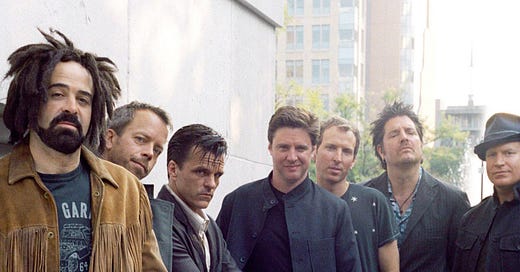I don’t remember exactly when it happened, but at some point in the aftermath of (or even during) Covid lockdowns I decided to give the newest Counting Crows record, a four-song EP referred to as the Butter Miracle Suite, a shot. It was released in May of 2021, but between extended pandemic quarantines and the birth of my first child that whole period is shrouded in a general haze, and so I neither remember when exactly nor why I decided to jump back in with this one.
Some background: as anyone who has spent any time with me or this newsletter knows, Pearl Jam has long been my favorite band. But Counting Crows were my first favorite band. They were also the first act, other than the Teenage Mutant Ninja Turtles, that I ever saw in concert, at Chastain Park amphitheater in 1997 with opening act The Wallflowers (I bought and completely wore out this tour shirt). And while I always held those first four records in very high regard, at some point I drifted away and my fandom waned somewhat. I don’t even remember precisely why - the Shrek song may have done it, though now that I’m an old softie I think it’s not all that bad in retrospect.
Whatever the reason, I hadn’t listened to a new record of theirs in full since Hard Candy in 2002. But something brought me to Butter Miracle, and while at first I was dubious and resistant I realized pretty quickly that it had completely sucked me in and won me over. That first EP is basically one extended composition, the songs flowing together and one into the next like a mini musical. It is entirely cohesive while also covering a lot of dynamic ground musically. It won me back over to the band in a big way.
The new extended version elicited a similar initial reaction - I wasn’t sure if the five additional songs measured up to the original four, which I had grown so fond of and familiar with, but after a few listens I couldn’t get them out of my head, and I have been listening non-stop for the past week.
I need to revisit something I said above, about not knowing why I initially drifted away. It’s true and not true at the same time. While not the entire reason, the split did align with a larger trend that I indulged starting in my twenties - trying to move as far away from my former self as I could. Some of this was in response to things that I was happy to leave behind - self-inflicted religious fundamentalism, conservative leanings - but I also ended up throwing out the baby with the bath water and rebelling against everything that I had known and loved.
Some of this may have been an immature attempt at growth and betterment, but I also was not happy in my twenties. I was lost and adrift, and my life wasn’t turning into what I had wanted it to be coming out of college. This was to a large degree my own fault, and so I decided to take it out on myself in the wrong ways - including turning my back on any and everything that had given me joy as an adolescent and later a teen.
I think everyone goes through this to some degree. And what you learn eventually if you’re lucky and make it through without completely either destroying yourself or giving up on life entirely is that you can’t run away from yourself. This is true in the good ways just as much as the bad. Even the elements that you rightfully grow away from are still in some ways a part of you; or at the very least, they are a part of what made you the you that you currently are. It’s not only futile to ignore that, it’s impossible. It is what it is, and one’s own history can never be changed anyway so why fight it? You have to reconcile with, rather than deny or evade, your own past. You have to make peace with it. The irony being that it is only when you do this that you are ever really able to begin trying to move forward.
I have in particular these last four years, especially since becoming a father, stopped trying to run from who I used to be, which means at times re-visiting and re-embracing some of the things that I used to love and cherish. Sometimes you realize that those things belong in the past where you left them, but sometimes you discover a new value in them from a different perspective.
It is not lost on me that Crows frontman and songwriter Adam Durritz seems himself to be in a somewhat better place than he has been in years and records past. I wrote last year about the comfort in Robert Smith staying in the same emotional place in which he’s always been on the latest Cure record; here we have the inverse and equally comforting counterpart. There is an undeniable power, an almost cosmic synchronicity, in touching base with an artist whose morose lamentations kept me company and helped me through some of my darkest periods and finding that we have both begun to figure things out.
-cs




